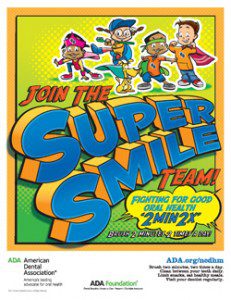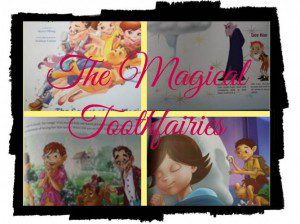 It may surprise you to know tooth decay (which leads to cavities) remains the most common chronic disease in children, despite the fact it can be easily prevented. Even more concerning is this number is increasing in preschool age children, according to the National Institute of Dental and Craniofacial Research (NIDCR). The NIDCR reports that over 40% of children ages 2 to 11 have had a cavity in their baby teeth; a problem that is entirely preventable through good oral hygiene. Good dental hygiene is an important issue for parents to implement with their children from a very young age.
It may surprise you to know tooth decay (which leads to cavities) remains the most common chronic disease in children, despite the fact it can be easily prevented. Even more concerning is this number is increasing in preschool age children, according to the National Institute of Dental and Craniofacial Research (NIDCR). The NIDCR reports that over 40% of children ages 2 to 11 have had a cavity in their baby teeth; a problem that is entirely preventable through good oral hygiene. Good dental hygiene is an important issue for parents to implement with their children from a very young age.
This February marks the 65th annual month-long focus on children’s dental health. National Children’s Dental Health Month is sponsored by the American Dental Association (ADA) to raise awareness about oral hygiene. Throughout the month, the benefits of good oral hygiene are promoted extensively to children and their families, teachers, and other caregivers. To further this campaign, the ADA provides many free resources for parents and educators, to include posters. This year’s motto: “Join the Super Smiles Team!”
The ADA recommends children brush for “Two Minutes, Two Times a Day.” However, brushing teeth is often a chore many children (and their parents) dread. Part of the goal of National Children’s Dental Health Month is to provide activities and support materials to help parents and teachers make brushing teeth fun.
BABY TEETH MATTER!
Baby teeth play an important role in speech development, a child’s appearance and facial structure, nutrition and ensuring permanent teeth erupt in their normal positions.
Although baby teeth are eventually replaced with permanent teeth, it is essential to keep them healthy. Decay and infection in baby teeth can cause damage to developing permanent teeth.
Tips from America’s ToothFairy!
* Parents and caregivers can share tooth-decay causing bacteria when they clean their child’s pacifier or bottle nipple by placing it in their mouths or when they share a child’s food and drink. Clean bottle nipples and pacifiers in warm soapy water and avoid sharing food and drinks with your children.
* Beginning at birth, clean infant gums with a damp cloth or soft toothbrush and warm water after each feeding, and check your child’s gums/teeth daily.
* Encourage children to drink water, not juice, in between feedings. Never put a bottle or sippy cup in the crib with anything but water.
* Children learn by example, brush and floss your teeth with them to encourage good oral health habits.
* Have your child create a calendar to track good oral health practices. Post the calendar in the bathroom and reward children with a gold star or happy face for each day of great oral care!
Good habits begin in the home. Developing a good oral hygiene routine at an early age and visiting the dentist regularly will help your children ward off tooth decay and cavities. Let’s help our kids “Join the Super Smiles Team” today!
Resources for parents:
* America’s ToothFairy Kids Club
- Join the FREE America’s ToothFairy Kids Club. Members will receive personalized letters from the ToothFairy and quarterly fun educational activities!
- For more fun facts, tips, photos and to see the winning video, “like” America’s ToothFairy on Facebook, follow on Twitter, and pin on Pinterest !
* Fun activity sheets to help children have fun while brushing their teeth.

* MedlinePlus Magazine feature on Children’s Dental Health contains lots of helpful information related to children’s dental health (published by National Institute of Dental and Craniofacial Research (NIDCR))
* Free booklets, brochures, teacher’s guides and activities in English and Spanish specifically about Children’s Dental Health
* Books and CD’s about the ToothFairy, such as The Magical ToothFairies, help engage children and get them excited about dental health















Good oral hygiene from the start is SO important!!
I do want to point out, however, that not all tooth decay is the same. While there is no doubt the role sugary foods and lack of brushing play, genetics have now been found to play a large role. Here are some interesting reads about the other factors that are important to consider!
http://www.dentistrytoday.com/todays-dental-news/3909-genetic-link-for-tooth-decay
http://www.townsendletter.com/Nov2006/childtooth1106.htm
I share this information to augment your piece! I have found that many mainstream pieces of advice are outdated or misguided. For instance, that fluoridated drinking water is all good and no harm (research has linked it to lower IQ!)- and that breastfeeding at night will cause decay (FALSE- while the enzymes in milk may react with sugar and cause decay, as long as teeth are brushed well before bed, nursing all night long/breastmilk alone will not cause problems). Obviously everyone needs to weigh all their options and be sure to do their best to properly clean their child’s teeth. But that doesn’t mean children won’t still have problems! I have a close friend who is very diligent about oral health, who avoids processed foods, sugar, etc- and who’s child still had extensive decay. Obviously just an anecdote- and certainly not meant to prove conventional wisdom wrong! But parents should be aware that even when doing everything- or almost everything- right, they may be facing underlying issues not related to behavior. And, there are alternative approaches which have been shown to be quite effective!
Totally agree! Brushing will not solve other issues so good oral care should always be partnered with regular visits to a dentist! Thanks for the input!
I just wanted to add that there are a few conditions that exacerbate or promote decay despite the best oral hygiene. My son has a grade IV upper lip tie and his top incisors have been significantly affected. We brush two, sometimes three, times a day, he has never had candy or juice, only rarely gets anything sweet, I don’t serve processed or pre-packaged food in my home, and we see the dentist monthly for fluoride treatments. Despite all our oral hygiene, he still has significant decay and will most likely need dental work in the form of fillings or caps before he loses his baby teeth.
Recently there has been a body of research published which links upper lip ties and tongue ties to decay, dispelling the myth that breastfeeding causes decay or that decay can be prevented by “proper” oral hygiene.
I’ve found several other mamas with the same experience and hope to help dispel some of the guilt associated with the assumption that decay = neglectful or inadequate dental hygiene. I know when I first realized we were hving decay issues, I beat myself up and piled on the mama guilt. Luckily in my research I learned a bit about what was actually causing it and, while I have mama guilt to spare about other stuff, the dental hygiene guilt washed away 🙂
That’s really interesting. I didn’t know about the upper lip ties and and tongues with a tie to tooth decay! Sounds like you have another really great post in the workings for all those mothers going through the guilt!
saw nice nice